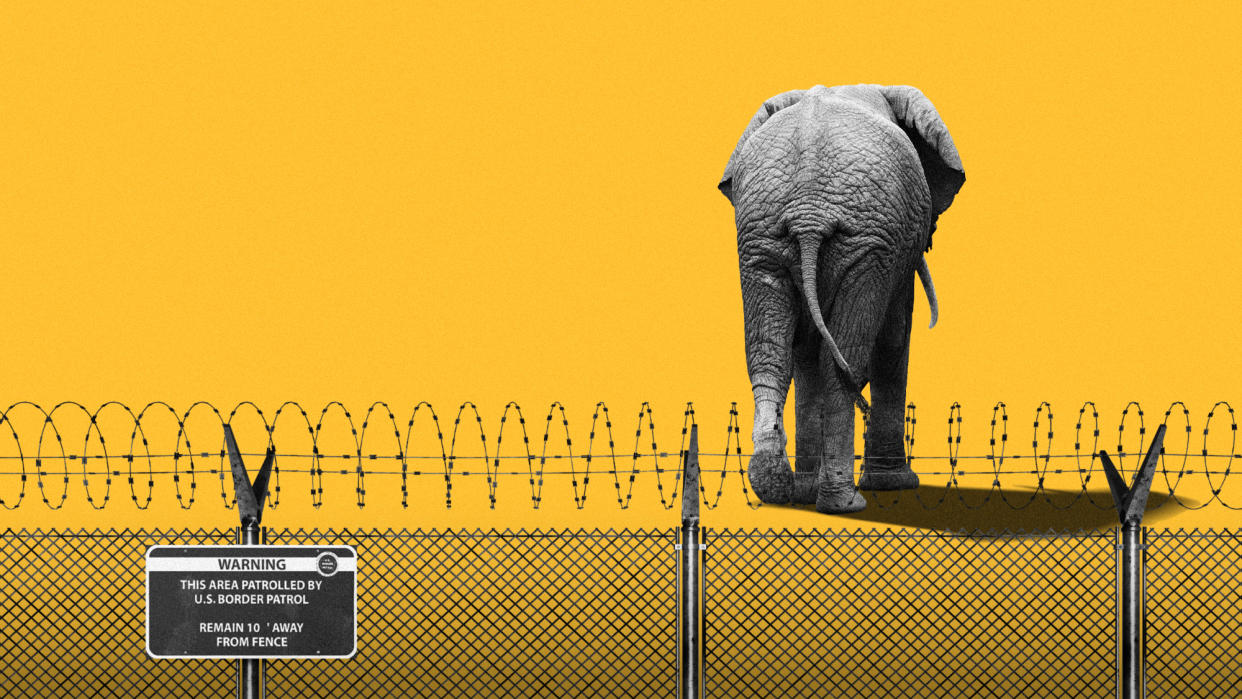Why are House Republicans backing off immigration reform?

- Oops!Something went wrong.Please try again later.
House Republicans want a border deal — but not the one on offer.
Speaker Mike Johnson on Wednesday "voiced skepticism" about an emerging Senate proposal to link Ukraine aid to tougher immigration enforcement, The Hill reported. "I don't think now is the time for comprehensive immigration reform," he told a press conference, "because we know how complicated that is." His comments came amid warnings that a looming budget deadline could actually make the border crisis worse.
The GOP has been agitating about immigration for years, so why not take the opportunity for progress on the issue? One possibility: It's not good for Donald Trump. The Messenger reported that Trump has warned Johnson not to make a deal. "He and I have been talking about this pretty frequently," Johnson acknowledged. That brought a backlash from Democrats. "They're hoping for chaos at the border and trying to stop us from preventing it," said Rep. Jamie Raskin (D-Md.).
Trump, of course, is gearing up to take on President Joe Biden in November: An immigration deal could rob him of his signature issue against the incumbent. Indeed, USA Today reported that some House Republicans don't want to sign onto a bipartisan deal "because it would help Biden's reelection prospects." And Johnson reportedly told his fellow Republicans that an immigration bill "must wait until former President Donald Trump or another Republican regains the presidency."
What the commentators said
"The status quo favors Republicans," Rich Lowry argued at The New York Post. It's Biden — not the GOP — that needs to take drastic action at the border, where the crisis has become so palpable that "even the media have started to notice." That gives Republicans the upper hand when arguing for the strictest border enforcement possible. There's "growing recognition that the chaos at the border is hurting Biden, and he needs to do something about it."
House Republicans should "listen to the American people on the border crisis and negotiate," The Chicago Tribune editorialized. Biden and "savvy Senate Democrats" have finally come to the table on immigration, giving "real hope that a serious, comprehensive bill could emerge." So it's not great that House Republicans "already are declaring the Senate product dead on arrival." If the border crisis really is a crisis, the folks in charge should respond with action instead of obstruction. To do otherwise in hopes of helping Trump "is strikingly cynical, even for this day and age."
But Republicans aren't the only ones wary of a bipartisan bill. "This border deal is a political trap for Democrats," Andrea R. Flores, a former immigration adviser to the Biden administration, warned in The New York Times. It's true that "voters strongly disapprove of President Biden's handling of the border." The status quo is "unsustainable." But any border deal that relies mostly on tougher border enforcement while failing to expand legal pathways to immigration will only make the crisis worse. "There is too much at stake for Democrats to accept the terms of this Senate proposal."
What next?
There's a problem with the House Republican approach. "To those who think that if President Trump wins, which I hope he does, that we can get a better deal — you won't," Sen. Lindsey Graham (R-S.C.) said Wednesday. Why? Because any immigration bill must receive 60 votes to pass the Senate. Even if Republicans pick up a Senate majority in November, it's unlikely they'll meet that threshold. Which means that any deal will involve compromise from both sides. There's no time like the present, Graham said: "This is a historic moment to reform the border."
But it's not clear how much tougher border enforcement would alleviate border pressures, Eduardo Porter argued at The Washington Post. Border Patrol has increased its staffing "fivefold" since the early 1990s, while the number of undocumented migrants living here has still tripled. Immigrants are driven to the U.S. by "hunger, climate change and a desire for opportunity." That won't change until their circumstances do. "Hardening the border will not keep them out."

